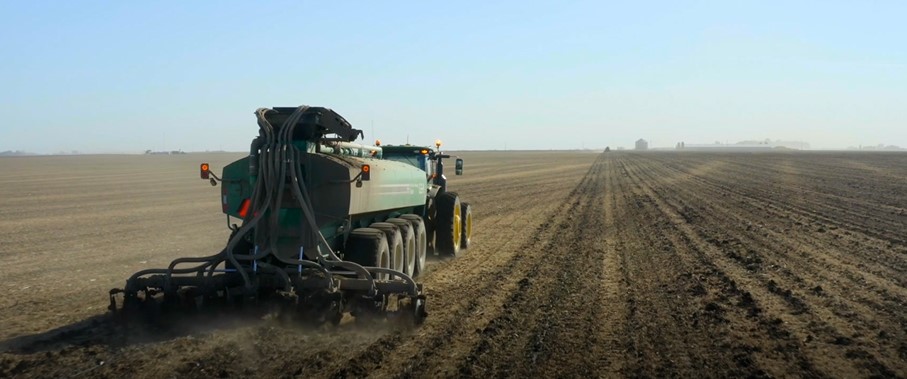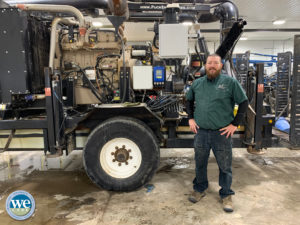
Grain crops need both macronutrients and micronutrients to be able to produce grain. Farmers have the option to choose what type of fertilizer to apply to the soil for the upcoming crop. Each fertilizer is different in terms that each holds different amounts of nutrients, have different application methods, and timing of application varies.
At Reicks View Farms, they use the manure produced from their livestock as a fertilizer. Manure is a natural, organic fertilizer that not only holds adequate amounts of the essential nutrients: Nitrogen, Phosphorus, and Potassium, but also provides a range of benefits to the environment. “The manure takes care of all of the crops fertilizer needs,” said Josh Geiselhart, Manure Operations Manager at Reicks View Farms. “We don’t need any additional methods of fertilizer as the manure holds all of the nutrients that is needed for the crop.”
 The type of fertilizer application method can play a critical factor in how it affects the environment. “We have a high set of standards set in place throughout the application process to ensure we are doing our best to protect the environment and the communities we live in.
The type of fertilizer application method can play a critical factor in how it affects the environment. “We have a high set of standards set in place throughout the application process to ensure we are doing our best to protect the environment and the communities we live in.The first thing we do is to test our soils and pits,” said Josh.
Each year, Reicks View Farms soil samples each field that they apply manure to check the nutrient levels in the soil. This gives them an accurate representation to conclude if fertilizer is needed. They additionally collect samples of the manure in the pits to see how much nutrients is in the manure that they’d potentially add to the soil.
Once they have a full report of the fertilizer needed for the soil and how much manure is holding nutrients, they complete a Manure Management Plan (MMP) with the Iowa DNR (Department of Natural Resources). The Iowa law requires all owners of a confinement feeding operation of an animal capacity of more than 500 animal units to submit a Manure Management Plan (MMP) to the DNR. A MMP tells the DNR a full detailed description of the operation including: Address of operation, type of animal production, number of animals, manure storage structure type, amount of manure produced, method of application, timing of application, the rate of application, and more. The MMP has to be approved by the DNR to meet Iowa regulations; ensuring the amount of manure applied to fields is safe for the environment.
Once the MMP is approved by the DNR, application is last. Josh said, “We inject the manure into the soil so it can bond to the soil particles and be available for the crop to use effectively. By injecting the manure deep into the soil bed instead of applying it to the topsoil, you’re reducing the chance of runoff into streams. It also helps avoid evaporation and reduces odor.”
Additionally, all of Reicks View Farms applicators are have their Commercial Manure Applicators certificates completed through the Iowa DNR. When they are in the process of application, they continuously monitor the flow of manure that is being injected to ensure it correlates with the MMP.
The manure isn’t just beneficial to the soil and crop, but also has a critical role in the nutrient cycle which uses the resources into a cycling system. Brady Reicks, Co-Owner of Reicks View Farms, said “Over the years, we’ve learned to make better use of our resources. Before the 1970’s my Dad would say that we didn’t fully appreciate the value of manure. Now we know it’s a great natural fertilizer. The manure our pigs produce is just enough to fertilize our feed corn, which in turn provides food for our pigs.”